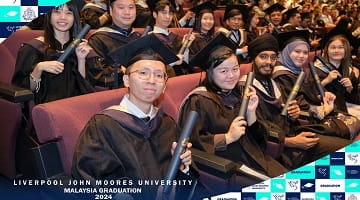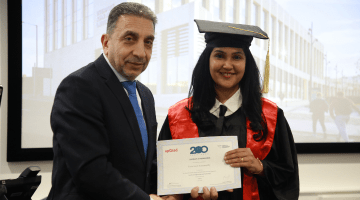Why study this course with LJMU?
- Opportunity to undertake a year's paid industrial placement
- Strong links with over 450 local and national organisations
- Very high academic and professional standing, with official commendation for excellent teaching and research standards
- 6million investment in state-of-the-art teaching facilities
- International Foundation Year course available offering direct progression onto this degree programme - visit LJMU's International Study Centre to find out more
About your course
This programme was developed in direct response to the increasing demand from employers in the financial sector for graduates with an understanding of Mathematics. In the world of finance, being able to employ high-level mathematics to help understand and model the markets makes you highly employable.
About the Foundation Year
The Foundation Year is ideal if you have the ability to study for a degree but don't have the qualifications to enter directly onto the Mathematics with Finance honours degree programme. Once you pass the Foundation Year you will progress directly onto the first year of the honours degree. If you are a full-time UK student, you will qualify for student financial support for the full duration of your course (subject to eligibility criteria).
About the BSc (Hons) Mathematics with Finance
These studies will build a solid foundation in quantitative methods combined with an understanding of how to use mathematical and statistical applications. Finance modules are studied at each level to give the course its distinctive flavour. In the final year, you will have a chance to specialise in areas like operational research, multivariate analysis and data mining, corporate finance and international finance.
This degree has a very high academic and professional standing and the Applied Mathematics Department has been formally recognised for its high quality teaching, excellent resources and dedicated staff. The Department also boasts state-of-the-art facilities at its Byrom Street campus, with over 150 high performance computers and industry-standard software.
We aim to improve your employability wherever possible on this course, which is why practical modules are introduced at every level. Most importantly, you can spend a sandwich year on a paid work placement to get a taste of what it's really like to work in industry.
The Department's strong links with over 450 local and national organisations mean that all of its courses are designed and developed to suit the needs of employers today, as well as creating excellent work placements for students. Currently we have close ties with IBM, Airbus, Vauxhall, Kellogg's, the NHS, The Ministry of Defence and Pfizer to name but a few.
Course modules
What you will study on this degree
Further guidance on modules
Modules are designated core or optional in accordance with professional body requirements, as applicable, and LJMU’s Academic Framework Regulations. Whilst you are required to study core modules, optional modules provide you with an element of choice. Their availability may vary and will be subject to meeting minimum student numbers.
Where changes to modules are necessary these will be communicated as appropriate.
Core modules
Core modules
Core modules
Optional Modules
Core modules
Optional Modules
Professional accreditation/links
This programme is accredited by the Institute of Mathematics and its Applications (IMA), a professional body of mathematicians.
This programme will meet the educational requirements of the Chartered Mathematician designation, awarded by the Institute of Mathematics and its Applications, when it is followed by subsequent training and experience in employment to obtain equivalent competences to those specified by the Quality Assurance Agency (QAA) for taught masters degrees.
Your Learning Experience
Excellent facilities and learning resources
We adopt an active blended learning approach, meaning you will experience a combination of face-to-face and online learning during your time at LJMU. This enables you to experience a rich and diverse learning experience and engage fully with your studies. Our approach ensures that you can easily access support from your personal tutor, either by meeting them on-campus or via a video call to suit your needs.
You will begin the course with a three day induction and then spend approximately 15 hours per week in the classroom. Independent study is a fundamental element of the course and accounts for about 70% or around 35 hours of your weekly study time.
Teaching is mostly via lectures with informal lab sessions, online activities and small-group tutorials to reinforce ideas discussed in the lectures and to give you a chance to develop ideas with staff and other students.
Work-related Learning
A 12-month paid work placement in your third year gives you the ideal opportunity to get a taste of what it's really like to work in industry. Thanks to our extensive industrial links, we are able to place you with high-profile companies like Intel, Morgan Stanley and Saab where you will be able to put into practice skills learnt during your first two years and also gain new skills.
This experience will significantly enhance your CV and give you that competitive edge over other candidates when you first enter the graduate job market.
Dedicated personal tutor, plus study skills support
This is a supportive and friendly department. Should you choose to undertake a year's work placement, this support will continue as a supervisor will stay in close contact and visit you two or three times at your workplace.
Assessment varies depending on the modules you choose, but will usually include a combination of exams and coursework.
We recognise that all students perform differently depending on how they are assessed, which is why we use a combination of exam and coursework assessment methods for each module. Typically 40% of your mark comes from coursework and 60% from an exam, although some modules could be assessed entirely by coursework depending on the nature of the subject.
Where you will study
This programme is delivered in the Byrom Street complex of LJMUs City Campus. Here you'll find high quality lecture theatres, meeting and seminar rooms plus social spaces and a large café. The Avril Robarts Library is just minutes away on Tithebarn Street.
Course tutors
-

-
 Lecturer/Senior Lecturer
Lecturer/Senior Lecturer -
 Lecturer/Senior Lecturer
Lecturer/Senior Lecturer -
 Professor
Professor -
 Reader
Reader
Career paths
The growth in the financial services sector in the UK and internationally continues to provide students with excellent graduate recruitment opportunities.
The growth in the financial services sector in the UK and internationally continues to provide students with excellent graduate recruitment opportunities.
Graduates will be able to forge successful careers within commercial and investment banks, financial services, finance companies, building societies and other fields related to mathematics and statistics.
Student Futures - Careers, Employability and Enterprise Service
A wide range of opportunities and support is available to you, within and beyond your course, to ensure our students experience a transformation in their career trajectory. Every undergraduate curriculum includes Future Focus during Level 4, an e-learning resource and workshop designed to help you to develop your talents, passion and purpose.
Every student has access to Careers Zone 24/7, LJMU's suite of online Apps, resources and jobs board via the LJMU Student Futures website.
Tuition fees and funding
- Full-time per year:
- £9,535
- Placement year:
- £1,905
The University reserves the right to increase tuition fees in accordance with any changes to the maximum allowable fees set by the UK Parliament. In the event of such a change, any fee increase will be subject to a maximum cap of 10% of the total course cost as originally stated at the time of your offer.
The fees quoted above cover registration, tuition, supervision, assessment and examinations as well as:
- library membership with access to printed, multimedia and digital resources
- access to programme-appropriate software
- library and student IT support
- free on-campus wifi via eduroam
Additional costs
Although not all of the following are compulsory/relevant, you should keep in mind the costs of:
- accommodation and living expenditure
- books (should you wish to have your own copies)
- printing, photocopying and stationery
- PC/laptop (should you prefer to purchase your own for independent study and online learning activities)
- mobile phone/tablet (to access online services)
- field trips (travel and activity costs)
- placements (travel expenses and living costs)
- student visas (international students only)
- study abroad opportunities (travel costs, accommodation, visas and immunisations)
- academic conferences (travel costs)
- professional-body membership
- graduation (gown hire etc)
Funding
There are many ways to fund study for home and international students. From loans to International Scholarships and subject-specific funding, you'll find all of the information you need on our specialist funding pages.
Entry requirements
Please choose your qualifications below to view requirements
Grades/points required from qualifications: CCD-CCC (88-96)
Work out how many UCAS points your qualifications are worth by visiting the UCAS Tariff Calculator.
Qualification requirements
How to apply
Securing your place at LJMU
UCAS is the official application route for our full-time undergraduate courses. Further information on the UCAS application process can be found here https://www.ljmu.ac.uk/study/undergraduate-students/how-to-apply.
Your university life
From accommodation and academic support to clubs and societies. Find out what LJMU has to offer.
Related Links
Talk to our students
Connect with a current LJMU student for advice and guidance on university life, courses and more.
See what our students are saying
At LJMU we want you to know you're making the right choice by studying with us. You can see what our students are saying about their experience with us through their reviews on the following websites:
Related Links
News and views
Browse through the latest news and stories from the university
The university reserves the right to withdraw or make alterations to a course and facilities if necessary; this may be because such changes are deemed to be beneficial to students, are minor in nature and unlikely to impact negatively upon students or become necessary due to circumstances beyond the control of the university. Where this does happen, the university operates a policy of consultation, advice and support to all enrolled students affected by the proposed change to their course or module.
Further information on the terms and conditions of any offer made, our admissions policy and the complaints and appeals process.




























